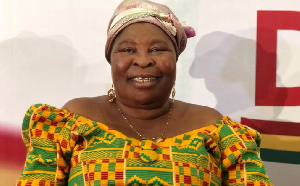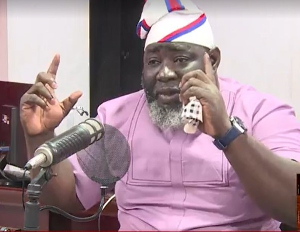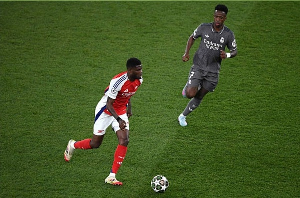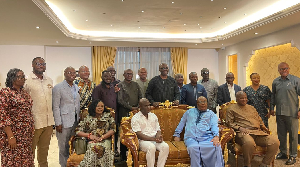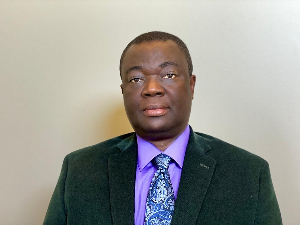I could hardly believe my ears when I heard His Excellency former President John Dramani Mahama claiming somewhat bizarrely that Akufo-Addo has wilfully mismanaged Ghana’s economy, and therefore the good people of Ghana should vote the NPP government out of power on 7th December 2024.
In my humble opinion, the good people of Ghana made a calamitous mistake by voting the NPP administration out in the 2008 general elections, as Ghana, as a matter of fact, was heading in the right direction following the eight years of prudent governance by the Ex-President Kufuor’s administration.
But in spite of all the advantageous programmes and policies that put the country in a highly favourable economic position, discerning Ghanaians disastrously bought into the NDC’s propaganda and voted out the NPP administration in 2008.
There is no gainsaying the fact that all over the world, prudent and pragmatic governments, more often than not, manage to improve upon the economic fortunes of their respective countries if they are allowed to stay in power a bit longer.
Take, for instance, the Rwandan current president, Paul Kagame, has been in power since 2000 and has managed to transform the country’s economy tremendously.
In fact, Rwanda has undergone rapid development largely due to the implementation of pragmatic policies and programmes over a sustained period of time.
In Malaysia, Mahathir Mohamad, who returned in 2018 as the head of the opposition coalition, and the oldest Prime Minister at 93 years old, stabilised the Malaysian economy from 1981 to 2003.
Tun M, as Mahathir is called by his supporters, oversaw a period of rapid economic growth and development in Malaysia during his first long stint in office.
In the United Kingdom for example, the Labour Party assumed power from 1997 to 2010 under two separate Prime Ministers, Tony Blair from 1997 to 2007 and James Gordon Brown from 2007 to 2010.
Needless to say, Blair and Brown did their utmost best and managed to stabilise the United Kingdom’s economy until the Labour Party lost power to the Conservative Party in 2010.
That being said, to every rule, there is an exception, and this is no different in the case of Ghana.
Regrettably, in Ghana, since regaining independence from the British on 6th March 1957, the NDC tradition (PNDC and NDC) had governed the country more than any other government one can think of. In fact, that tradition had governed Ghana for approximately 27 years out of Ghana’s 67 years with little to show for it.
Since the inception of the Fourth Republican Constitution, the day-to-day management of the country had been a shared responsibility between the National Democratic Congress tradition, whose share of the governance is 27 years and the New Patriotic Party (UP tradition) has also governed the country for nearly 16 years.
Some of us have always held a firm and unadulterated conviction that governance is a serious business and as such it requires forward thinking, serious and committed candidate to bring about the needed progress.
Nevertheless, it has not always been the case in Ghana’s democratic dispensation. We have more often than not been relying on lousy economic managers whose main preoccupation is to amass wealth at the detriment of the poor and disadvantaged Ghanaians.
If we stroll down memory lane, three years after former President Kufuor’s NPP administration had worked tirelessly and discovered oil in commercial quantities, the NDC administration led by the late President Mills only had the easiest job of turning on the valve at an offshore platform in December 2010 to pump the first commercial oil.
Ghana rightly associated itself with the petroleum exporting countries. And believe it or not, Ghana started to export crude oil which boosted the economic growth.
The economy grew favourably from around 8.4 per cent to around 14 per cent by 2011 and Ghana subsequently reached the Lower Middle Income status.
Ghana’s GDP grew exponentially from GH28 billion to a staggering GH47 billion by 2011.
Ghana was then cited as the world's fastest growing economy in 2010 (Economy Watch, 2010).
To his credit, the late President Mills continued to improve upon the excellent economic foundation laid by former President Kufuor and his NPP government.
President Mills mysteriously departed from life in July 2012. And, per Ghana’s 1992 Constitution, Vice President Mahama was the next in line to take over the presidency.
Things regrettably started to fall apart. It went from bad to worse following President Mills sudden and mysterious death.
Ghana’s total debt rocketed astronomically (GH9.5 billion in 2009 to GH122.4 billion as of December 2016). This was as a result of the unbridled spending in the 2012 election and the numerous corruption scandals involving GYEEDA, SADA, SUBA, Bus Branding, dubious judgement debt payments amongst others.
Ghana’s economic growth rate was woefully reversed from 14% in 2011 to an incredible 3.6% by 2016. The GDP was shockingly reduced by GH10 billion (from GH47 billion in 2011 to GH37 billion in 2016).
The erstwhile Mahama administration incredibly reversed the agricultural growth from 7.4% in 2012 to a disappointing 3.0% by December 2016.
Despite the absence of pernicious corona virus or Ukraine/Russia impasse during the Mahama administration, Ghanaians became fed-up with the extreme harsh conditions amid corruption allegations (Bus branding, Brazil World Cup, SADA, SUBA, GYEEDA, SSNIT, MASLOC, NCA, Ford Expedition Vehicle, amongst others).
Notwithstanding the incontrovertible evidence of wilful mismanagement, the NDC loyalists would want discerning Ghanaians to believe that the erstwhile NDC government provided exceptional governance.
Ghana’s economic growth regrettably slowed for the fourth consecutive year to an estimated 3.4% in 2015 from 4% in 2014 as energy rationing, high inflation, and ongoing fiscal consolidation weighed on economic activity (World Bank, 2016).
In addition, the high inflation rate remain elevated at 18.5% in February 2016 compared to 17.7% in February 2015, even after the Central Bank’s 500 bps policy rate hikes (the inflation stood at 15.8 per cent as of October 2016).
Ex-President Mahama and his NDC apparatchiks slyly took refuge in their much touted infrastructural projects after failing to initiate expedient policies to overturn the failed policies of agriculture, poverty reduction and resource allocation in the areas of healthcare, education, finance, supply chain management and security sector planning, amongst others.
As a matter of principle, some of us will keep questioning the judgement of those who have been proclaiming somewhat brashly that Ghana’s economy under former President Mahama (3.4% growth and 15.4% inflation) was better than Akufo-Addo/Bawumia record before the insidious coronavirus (8.6% growth and 7.5% inflation).
Needless to say, before the deadly coronavirus, Bawumia dutifully assisted Akufo-Addo and raised Ghana’s economic growth from 3.4% to 8.6%.
Bawumia efficiently assisted Akufo-Addo and within a short space of time reversed the inflation from 15.4% to 7.5%.
Interestingly, in the first two years of the Akufo-Addo/Bawumia administration, the Agriculture sector recorded the highest growth rate of 8.4%.
Indeed, the Agriculture sector expanded from a growth rate of 3.0 percent in 2016 to 8.4 percent (GSS, 2018).
The Akufo-Addo/Bawumia administration, before the unspeakable coronavirus, recorded the highest growth rate of 16.7 % in the Industry sector.
The Industry sector, the highest growing sector with a GDP share of 25.5 percent, had its growth rate increasing from -0.5 percent in 2016 to 16.7 percent in 2017 (GSS, 2018).
My dear reader, if Mahama is not taking Ghanaians for granted, how on earth would he consider returning to the presidency given the dreadful errors in judgement during his tenure in office?
K. Badu, UK.
k.badu2011@gmail.com
Opinions of Tuesday, 15 October 2024
Columnist: Kwaku Badu

